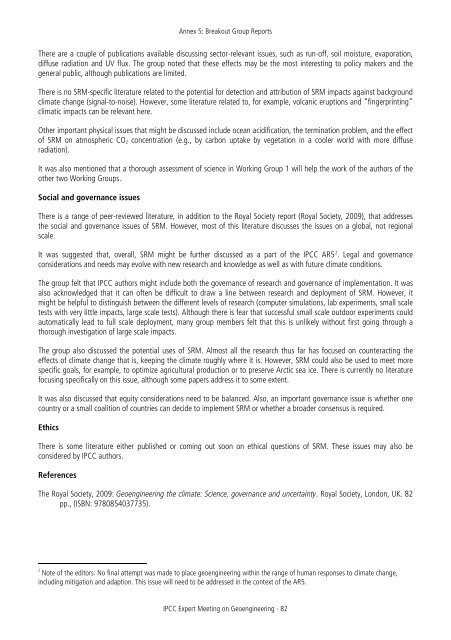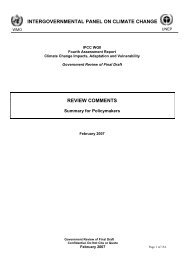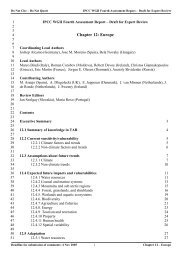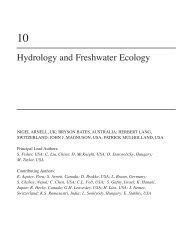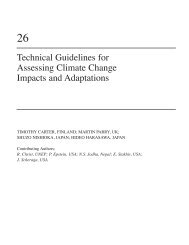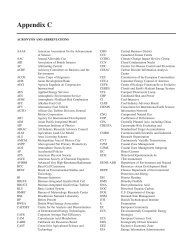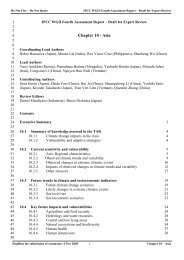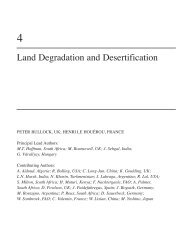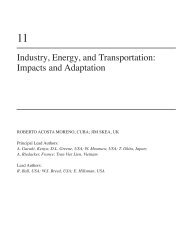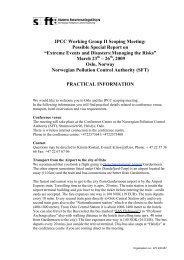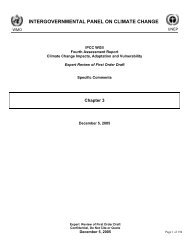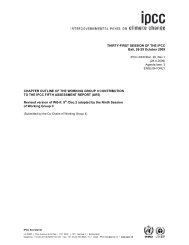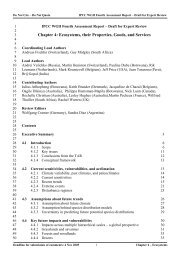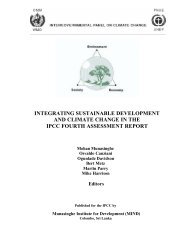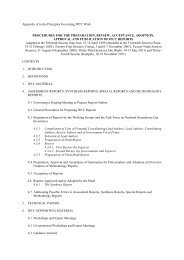IPCC Expert Meeting on Geoengineering
IPCC Expert Meeting on Geoengineering
IPCC Expert Meeting on Geoengineering
You also want an ePaper? Increase the reach of your titles
YUMPU automatically turns print PDFs into web optimized ePapers that Google loves.
Annex 5: Breakout Group Reports<br />
There are a couple of publicati<strong>on</strong>s available discussing sector-relevant issues, such as run-off, soil moisture, evaporati<strong>on</strong>,<br />
diffuse radiati<strong>on</strong> and UV flux. The group noted that these effects may be the most interesting to policy makers and the<br />
general public, although publicati<strong>on</strong>s are limited.<br />
There is no SRM-specific literature related to the potential for detecti<strong>on</strong> and attributi<strong>on</strong> of SRM impacts against background<br />
climate change (signal-to-noise). However, some literature related to, for example, volcanic erupti<strong>on</strong>s and “fingerprinting”<br />
climatic impacts can be relevant here.<br />
Other important physical issues that might be discussed include ocean acidificati<strong>on</strong>, the terminati<strong>on</strong> problem, and the effect<br />
of SRM <strong>on</strong> atmospheric CO 2 c<strong>on</strong>centrati<strong>on</strong> (e.g., by carb<strong>on</strong> uptake by vegetati<strong>on</strong> in a cooler world with more diffuse<br />
radiati<strong>on</strong>).<br />
It was also menti<strong>on</strong>ed that a thorough assessment of science in Working Group 1 will help the work of the authors of the<br />
other two Working Groups.<br />
Social and governance issues<br />
There is a range of peer-reviewed literature, in additi<strong>on</strong> to the Royal Society report (Royal Society, 2009), that addresses<br />
the social and governance issues of SRM. However, most of this literature discusses the issues <strong>on</strong> a global, not regi<strong>on</strong>al<br />
scale.<br />
It was suggested that, overall, SRM might be further discussed as a part of the <str<strong>on</strong>g>IPCC</str<strong>on</strong>g> AR5 2 . Legal and governance<br />
c<strong>on</strong>siderati<strong>on</strong>s and needs may evolve with new research and knowledge as well as with future climate c<strong>on</strong>diti<strong>on</strong>s.<br />
The group felt that <str<strong>on</strong>g>IPCC</str<strong>on</strong>g> authors might include both the governance of research and governance of implementati<strong>on</strong>. It was<br />
also acknowledged that it can often be difficult to draw a line between research and deployment of SRM. However, it<br />
might be helpful to distinguish between the different levels of research (computer simulati<strong>on</strong>s, lab experiments, small scale<br />
tests with very little impacts, large scale tests). Although there is fear that successful small scale outdoor experiments could<br />
automatically lead to full scale deployment, many group members felt that this is unlikely without first going through a<br />
thorough investigati<strong>on</strong> of large scale impacts.<br />
The group also discussed the potential uses of SRM. Almost all the research thus far has focused <strong>on</strong> counteracting the<br />
effects of climate change that is, keeping the climate roughly where it is. However, SRM could also be used to meet more<br />
specific goals, for example, to optimize agricultural producti<strong>on</strong> or to preserve Arctic sea ice. There is currently no literature<br />
focusing specifically <strong>on</strong> this issue, although some papers address it to some extent.<br />
It was also discussed that equity c<strong>on</strong>siderati<strong>on</strong>s need to be balanced. Also, an important governance issue is whether <strong>on</strong>e<br />
country or a small coaliti<strong>on</strong> of countries can decide to implement SRM or whether a broader c<strong>on</strong>sensus is required.<br />
Ethics<br />
There is some literature either published or coming out so<strong>on</strong> <strong>on</strong> ethical questi<strong>on</strong>s of SRM. These issues may also be<br />
c<strong>on</strong>sidered by <str<strong>on</strong>g>IPCC</str<strong>on</strong>g> authors.<br />
References<br />
The Royal Society, 2009: <strong>Geoengineering</strong> the climate: Science, governance and uncertainty. Royal Society, L<strong>on</strong>d<strong>on</strong>, UK. 82<br />
pp., (ISBN: 9780854037735).<br />
2<br />
Note of the editors: No final attempt was made to place geoengineering within the range of human resp<strong>on</strong>ses to climate change,<br />
including mitigati<strong>on</strong> and adapti<strong>on</strong>. This issue will need to be addressed in the c<strong>on</strong>text of the AR5.<br />
<str<strong>on</strong>g>IPCC</str<strong>on</strong>g> <str<strong>on</strong>g>Expert</str<strong>on</strong>g> <str<strong>on</strong>g>Meeting</str<strong>on</strong>g> <strong>on</strong> <strong>Geoengineering</strong> - 82


